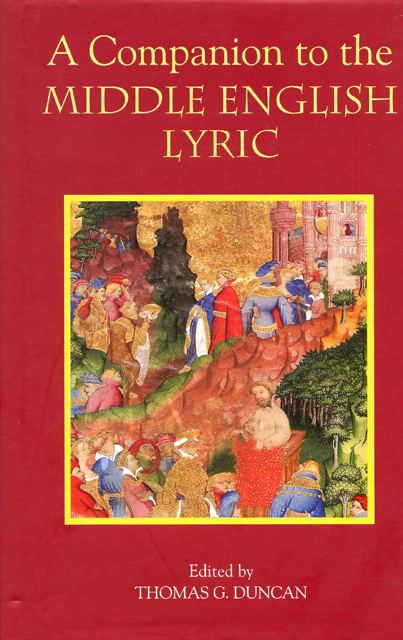Book contents
- Frontmatter
- Contents
- Acknowledgements
- Abbreviations
- Editorial Note
- Introduction
- 1 Middle English Lyrics and Manuscripts
- 2 Middle English Lyrics: Metre and Editorial Practice
- 3 The Love Lyric before Chaucer
- 4 Moral and Penitential Lyrics
- 5 Middle English Religious Lyrics
- 6 Middle English Courtly Lyrics: Chaucer to Henry VIII
- 7 The Middle English Carol
- 8 Political Lyrics
- 9 The Lyric in the Sermon
- 10 ‘Cuius Contrarium’: Middle English Popular Lyrics
- 11 Gender and Voice in Middle English Religious Lyrics
- 12 Lyrics in Middle Scots
- Bibliography of works cited
- Index of Manuscripts Cited
- General Index
- Index of Lyrics
4 - Moral and Penitential Lyrics
Published online by Cambridge University Press: 23 March 2023
- Frontmatter
- Contents
- Acknowledgements
- Abbreviations
- Editorial Note
- Introduction
- 1 Middle English Lyrics and Manuscripts
- 2 Middle English Lyrics: Metre and Editorial Practice
- 3 The Love Lyric before Chaucer
- 4 Moral and Penitential Lyrics
- 5 Middle English Religious Lyrics
- 6 Middle English Courtly Lyrics: Chaucer to Henry VIII
- 7 The Middle English Carol
- 8 Political Lyrics
- 9 The Lyric in the Sermon
- 10 ‘Cuius Contrarium’: Middle English Popular Lyrics
- 11 Gender and Voice in Middle English Religious Lyrics
- 12 Lyrics in Middle Scots
- Bibliography of works cited
- Index of Manuscripts Cited
- General Index
- Index of Lyrics
Summary
It is in the nature of preliterate and partially literate societies that their moral values and ethical principles will be encoded in and transmitted by memorial verse. Anglo-Saxon poetry bristles with proverbs and maxims, some perhaps of pre-Christian origin, others refracted from the so-called ‘wisdom’ books of the Old Testament such as Ecclesiastes, Ecclesiasticus and Proverbs, representing the collected aphorisms of another tribal society that had suffered displacement from its homeland. The hortatory tone of poems like Maxims I and II, Precepts, Vainglory and Fates of Men repeatedly stresses the importance of such proverbs and maxims in providing navigational tools for man's passage through the stormy seas of life (Shippey 1976; Larrington 1993).
The dramatic monologues of the Exeter Book are suffused with this proverbial lore, exploring its application to the challenging and changeful circumstances of each protagonist's life on earth, and revealing how such knowledge can be used in a prudent and wise manner. It is not accidental that one of the Wanderer's greatest hardships is the absence of his beloved lord's larcwidum [teaching words] and cuðra cwiddegiedda [known stories or utterances] (Mitchell and Robinson 2001, No. 16, 38 and 55). His exile has removed him from the familiar but reassuring guidance of tribal maxim and exemplary story. More ambitiously, The Seafarer dramatises its protagonist's search for a remedy for the sorge [sorrow] and longunge [longing] suffered by the earth-bound soul, allowing him to address the primal anxieties of death, judgement, heaven and hell (the fearful Four Last Things of Christian tradition). That poem's conclusion, Dol biþ se þe his Dryhten ne ondraedeþ; cymeð him seo deað unþinged [Foolish is he who does not fear his Lord; death comes to him unreflected on] (Mitchell and Robinson 2001, No. 17, 106), aligns itself ideologically and verbally with the proverbial lore found elsewhere in the Exeter Book:
Dol biþ se þe his dryhten nat, to þaes oft cymeð deað unþinged; snotre men sawlum beorgað, healdað hyra soð mid ryhte.
[A manwho does not know his lord is a fool: death often comes unexpectedly to him. Wise men look after their souls, they uphold their integrity with justice]
(Maxims I, 35–6, Shippey 1976, 64)- Type
- Chapter
- Information
- A Companion to the Middle English Lyric , pp. 68 - 95Publisher: Boydell & BrewerPrint publication year: 2005
- 2
- Cited by

